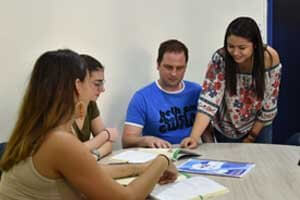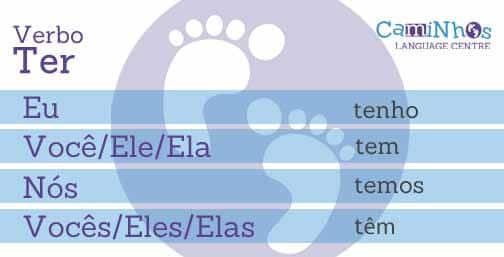Verb TER in the Present Indicative
We use the verb to have (TER) as follows:
EU TENHO
VOCÊ/ELE/ELA TEM
NÓS TEMOS
VOCÊS/ELES/ELAS TÊM
.
ATTENTION!
A gente TEM = Nós TEMOS
.
Use of verb TER
We usually use the verb TER (to have) to express: possession, physical traits, personality traits, age and existence.
.
Examples:
Eu tenho uma casa grande. (I have a big house.)
Ele tem cabelo ruivo. (He has red hair.)
Nós temos muita paciência. (He have lots of patience.)
Elas têm 21 anos. (They are 21 years old)
Tem uma padaria do lado da escola. (There is a bakery right beside the school.)

A professora Sônia tem cabelos castanhos.
(Teacher Sônias has brown hair.)
Laura tem 33 anos e tem 3 filhos. O maior tem 18 anos, o do meio tem 10 anos e o caçula tem 1 ano. Ela e o marido amam os filhos, mas eles ainda têm muitas dúvidas sobre a educação das crianças. Laura tem uma babá que ajuda com os filhos pequenos. Alexander, seu marido, tem um ótimo trabalho no Brasil. Os dois moram no Leblon, têm carros e uma casa de praia.
(Laura is 33 years old and has 3 children. The older one is 18, the middle one is 10 and the younger one is 1 year old. She and her husband love their kids, but they still have lots of questions about raising kids. Laura has a nanny that helps with the younger children. Her husband Alexander has a great job in Brazil. The two of them live in Leblon. They own cars and a beach house.)
.
New vocabulary
Caçula – a couple’s younger children.
Babá – a person that works taking care of children (usually when the parent’s go to work.)
Prateleira – a space/horizontal wooden board where products are organized inside the store.
.
Homework
Complete with the verb to have (TER):
.
NA PADARIA: (At the bakery:)
Marcus: Bom dia! ____ pão de provolone? (Marcus: Good morning! ____ provolone bread?)
Atendente: ____! Estão frescos. Saíram agora! (Clerk: ____! They are fresh, they are just out of the oven.)
Marcus: Vou querer seis, por favor. (Marcus: I want six of them, please.)
Atendente: O senhor quer mais alguma coisa? (Clerk: Do you want anything else?)
Marcus: Sim, por favor. ____ presunto? (Marcus: Yes, please. ____ ham?)
Atendente: Sim, claro. ____ duas marcas de presunto. Sadia e Seara. Só não ____ da Perdigão. Está em falta. (Clerk: ____ two brands of ham. Sadia and Seara. We don’t ____ Perdigão. We are missing it.)
Marcus: Qual a senhora recomenda? (Marcus: Which one do you recommend?)
Atendente: Os dois são bons. Posso partir bem fininho para o senhor. (Clerk: They are both good. I can slice them really thin for you.)
Marcus: Ok. Tá bom. Vou levar 200 (duzentos) gramas do da Sadia. Eu não ____ conhecimento de marca, mas esse parece bom. (Marcus: Okay. That’s good. I will have 200 grams of the Sadia one. I don’t ____ knowledge of this brand, but this looks good.)
Atendente: Certo. Vou cortar para o senhor. (Clerk: Good. I will have it sliced for you.)
Marcus: E leite desnatado, ____? (Marcus: What about milk, ____?)
Atendente: Bom, o senhor pode ver lá nas prateleiras, por favor. (Clerk: Well, can you check in the shelves, please?)
Marcus: Muito obrigado! (Marcus: Thank you.)
.
PAGANDO… (Paying for it…)
Caixa: Bom dia! Dá 30 reais, senhor. (Cashier: Good morning! It’s 30 reais, sir.)
Marcus: Aqui está. A senhora ________ troco para 50 reais? Infelizmente, não ____________ menor. (Markus: Here it is. Do you _____ change? Unfortunately, I don’t _____ a smaller bill.)
Caixa: Sim, eu ______________. Sem problema. (Cashier: Yes, I ____. No problem.)
Marcus: Obrigado! (Marcus: Thank you.)
.
Answers
Tem
Tem
Tem
Temos
Tem/Temos/Tenho (one of these options)
Tenho
Tem
Tem
Tenho
Tenho




